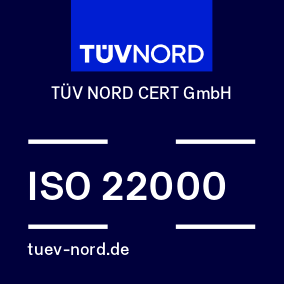ISO 22000: All-round Food Safety Management
Consumers not only expect highest quality products from food manufacturers, they also demand safe food. Standard ISO 22000 therefore covers all stages of the food chain and promotes comprehensive product safety in the food manufacturing sector.
The standard is valid throughout the world, which means that ISO 22000 certificates are also recognised internationally. Above all for customers focussing on export, this is an important argument when selecting suppliers. Added to this is systematic integration of Hazard Analysis and Critical Control Points, which enable you to establish reliable risk management in your company. A particular advantage of ISO 22000 is that every organization can install its own tailormade food safety management system and have it certified.




ISO 22000: Benefits at a glance
-
Systematic management for adherence to health and safety legislation
-
Food safety management system tailored to your organization
-
Internationally recognised
-
Fewer customer audits
-
Reduced product liability risk
-
Positioning as manufacturer of high-quality and safe food / food packaging materials
-
Greater customer satisfaction and enhanced trust
-
Integration with other ISO-based management systems possible
Climate Change Considerations to Management System Standards
On 22 February 2024, the International Accreditation Forum (IAF) and the International Organization for Standardization (ISO) IAF published a joint communiqué to highlight the addition of climate change considerations to a number of existing ISO management system standards (MSS).
Clauses 4.1 and 4.2 of the MSS are affected. This is to ensure that climate change issues are considered by the organization in the context of the effectiveness of the management system in addition to all other aspects.
Your route to certification




FAQs on ISO 22000
ISO 22000 was developed for food sector organizations of all sizes. Food retail chains are included within the scope of the standard, as are upstream and downstream sectors:
- Food manufacturing industry
- Animal feed manufacturing industry
- Primary production (animals and plants)
- Transport, storage
- Wholesale and retail
- Gastronomy/ Catering
- Packaging material, cleaning agent and additive industry
- Related services (e.g. pest control and plant and machinery manufacturers)
ISO 22000 is based on quality management standard ISO 9001 and augments it with HACCP and food-specific requirements. ISO 22000 was developed in order to cover the many requirements to which companies in the food or animal feed industry are subject and to render them certifiable.
The current version is ISO 22000:2018, which can be ordered from Beuth-Verlag.
Standard ISO 22000 covers the following categories, which form the basis of certification:
- Farming of animals, fish and plants (A and B)
- Food manufacturing (C)
- Animal feed production (D)
- Catering (E)
- Distribution (wholesale and trading), (F)
- Retail, transport and storage (G)
- Services for the food industry (H)
- Manufacturing of primary or secondary packaging materials (I)
- Manufacturing of machinery with food contact and vending machines (J)
- Manufacturing of food and animal feed additives, manufacturing of chemicals (K)
ISO 22000 includes the following requirements:
- Planning, introduction, maintenance and updating of a management system with the aim of increasing product safety and ensuring traceability
- Adherence to customer requirements and analyses of customer satisfaction
- Effective communication with suppliers, customers and other partners in the food supply chain
- Ensuring and implementing food safety policy
- Providing evidence of legal compliance to relevant third parties
Certification to ISO 22000 is simpler if an organization is already certified to existing food sector standards such as IFS Food, BRC Food or HACCP.
TÜV NORD CERT GmbH is an official provider of Lead Auditor Training which is certified by the CQI (Chartered Quality Institute) and the IRCA (International Register of Certificated Auditors).
Objective, neutral, independent: when it comes to certification, you can rely on TÜV NORD CERT. We have many years of experience and offer an extensive range of certifications based on our trusted international TÜV NORD brand. Our auditors have wide-ranging expertise, and annual training ensures that they are always at the forefront in their particular field – ensuring that audits are efficient and cost-effective. Our specialist knowledge and interdisciplinary approach mean we can offer practical combined certifications from one source, for example for FSSC 22000 und ISO 9001.
We are here to help you!
Send email
Your benefits from TÜV NORD CERT certification
Objective, neutral, independent: You can rely on us for certifications. You benefit from our many years of experience, our extensive range of certifications, and the globally recognized TÜV NORD brand. Our auditors have a wide range of expertise in your industry. Due to annual and comprehensive training courses, their knowledge is always up to date. In this way, they make a decisive contribution to a cost-effective and effective audit. Our interdisciplinary way of thinking and our broad expertise enable us to offer you useful combinations in the field of certification from a single source, for example in the field of FSSC 22000 and ISO 9001.